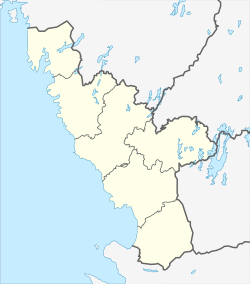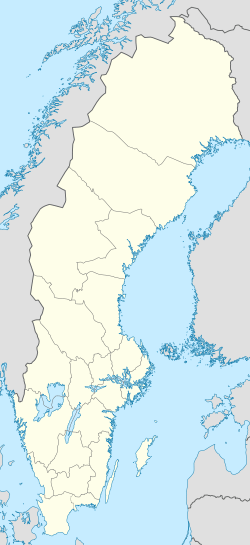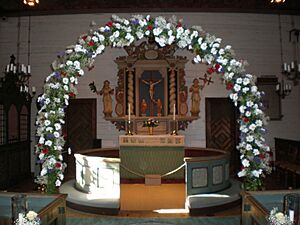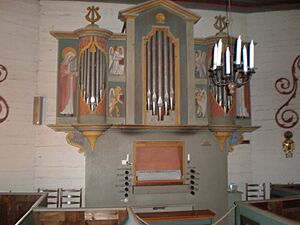Tylösand facts for kids
Quick facts for kids
Tylösand
|
|
|---|---|
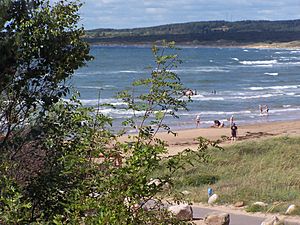
Tylösand in July 2004
|
|
| Country | Sweden |
| Province | Halland |
| County | Halland County |
| Municipality | Halmstad Municipality |
| Area | |
| • Total | 0.51 km2 (0.20 sq mi) |
| Population
(31 December 2010)
|
|
| • Total | 399 |
| • Density | 781/km2 (2,020/sq mi) |
| Time zone | UTC+1 (CET) |
| • Summer (DST) | UTC+2 (CEST) |
Tylösand is a popular area in Halmstad Municipality, Halland County, Sweden. In 2010, about 399 people lived there. It is located 7 kilometers (about 4.3 miles) west of Halmstad, on a point of land called Tyludden.
Tylösand is well-known for its long, sandy beach, which stretches for 7 kilometers (about 4.3 miles). It also has famous golf courses and a hotel called “Hotell Tylösand.” This hotel is partly owned by Per Gessle, a star from the music group Roxette, and Björn Nordstrand. In 2015, Tylösand became part of the nearby area of Frösakull.
History of Tylösand
People have lived in the Tylösand area for a very long time. Digs in Tylösand and Söndrum show signs of a Stone Age home from about 6,000 years ago. Tools like axes and arrows were found there. Remains from the Bronze Age have also been found on Tylö.
In 1563, the area of Tylösand was given to Halmstad by the Danes. Old records from the 1500s show that Tylösand was mostly a fishing village. It was hard to grow crops because the sand spread easily. This happened because trees were cut down, and the ground could no longer hold the sand in place.
The area of Tyludden and Tylösand was hard to reach. One of its bays, called “Tjuvahålan” (which means “the thieves’ hole”), was a popular spot for smugglers. To stop smuggling, a customs station was built in 1870. In the same year, the lighthouse on Tylö was built.
In 1905, a holiday place for school children was built. This helped make Tylösand a popular spot for vacations and fun. Tylösand became widely known as a seaside resort in the early 1900s. The first inn was built in 1915. In 1917, “Tylösands Havsbad” (Tylösand's sea baths) was started by the inn's owner and a royal photographer named Johan Hallberg. The hotel known today as “Hotel Tylösand” was built by Tylösands Havsbad in 1927 and opened in 1931. The old inn was taken down in 1985.
In the 1920s, camping became popular above Tjuvahålan, with tourists staying in tents. By the 1930s, small cottages were built for visitors. The golf course construction started in 1935 and was finished in 1938.
St. Olof's Chapel
The small wooden chapel of St. Olof sits on a rocky hill among birch and pine trees. An expert named Erik Salvén found out about this chapel in 1931. He heard about a wooden church built in 1721 that had been taken down in the late 1800s. This small church had been sold to a farmer and rebuilt into a house.
Since the farmer was thinking of tearing down the old chapel, Salvén decided to move it to Tylösand. He got help from his friend, a priest named Knut Peters. In 1950, the small St. Olof's chapel was put back together in Tylösand.
Prince Bertil's Path
Between 1954 and 1997, Prince Bertil of Sweden often stayed in his villa in Tylösand during the summer. A 13-kilometer (about 8-mile) long path is named after him.
The path starts at the palace in Halmstad and ends at the sandy beach of Tylösand. It is a good path for people of all ages, including those with disabilities. Part of the path goes through a beautiful Rhododendron park that was planted in 1933.
Images for kids
See also
 In Spanish: Tylösand para niños
In Spanish: Tylösand para niños
 | Janet Taylor Pickett |
 | Synthia Saint James |
 | Howardena Pindell |
 | Faith Ringgold |


